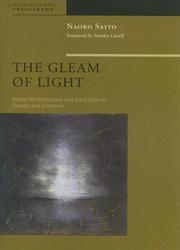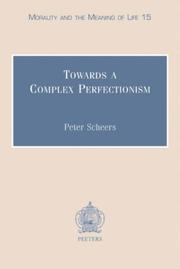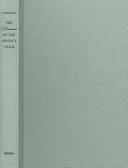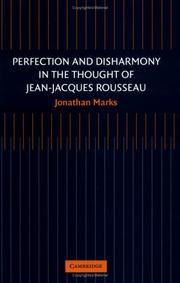| Listing 1 - 5 of 5 |
Sort by
|

ISBN: 0823235726 0823247929 0823224643 1429478861 0823224627 Year: 2005 Publisher: New York : [London : Fordham University Press ; Eurospan, distributor],
Abstract | Keywords | Export | Availability | Bookmark
 Loading...
Loading...Choose an application
- Reference Manager
- EndNote
- RefWorks (Direct export to RefWorks)
Saito reads Dewey's idea of progressive education through the lens of Emersonian moral perfectionism. She elucidates a spiritual and aesthetic dimension to Dewey's notion of growth, one considerably richer than what Dewey alone presents in his typically scientific terminology.
Education --- Perfection. --- Philosophy. --- Emerson, Ralph Waldo, --- Dewey, John, --- Flawlessness --- Perfection (Philosophy) --- Perfectionism (Philosophy) --- Virtuosity --- Wholeness --- Mysticism --- Philosophy --- Excellence --- Imperfection

ISBN: 9042916559 9789042916555 Year: 2005 Volume: 15 Publisher: Leuven Peeters
Abstract | Keywords | Export | Availability | Bookmark
 Loading...
Loading...Choose an application
- Reference Manager
- EndNote
- RefWorks (Direct export to RefWorks)
This book examines the content of a complex perfective anthropology beyond absolute, abstract, negative and minimalist readings. A rich sense of perfection is here to stay because of the ineradicable existential role of gradational estimation in terms of better and worse. The first section focuses on the connection between hermeneutics and perfectionism. The author claims that a hermeneutical conception of interpretation unavoidably implies a perfective scheme of better and worse, and that a contemporary perfectionism should be based exactly on a hermeneutical theory of interpretation. The second section introduces a differentiated language of perfection as positive. The author argues that we need a plurivocal list of kinds and levels of perfection as to be able to reach a higher sense of estimation. Human appraisal itself, so it turns out, can be undertaken in better and worse ways. The third section consolidates and extends the idea of a perfective anthropology. Here we are brought to a consideration of ourselves as organisms of a certain kind, of the personalised aspects of the human quest for perfection, of perfective experience in the context of concrete practices, and of the possibility of future perfection. The book ends with a chapter on environmental perfectionism, arguing that a benign human interpretation of non-human nature should include a careful application of the perfective concept of a life story to the realm of plants and animals. This application is meant to underscore the moral insight that we are not the only heroes of perfective being.
Philosophical anthropology --- General ethics --- Filosofie --- Philosophie --- Ethics --- Perfection --- Flawlessness --- Perfection (Philosophy) --- Perfectionism (Philosophy) --- Virtuosity --- Wholeness --- Mysticism --- Philosophy --- Excellence --- Imperfection --- Deontology --- Ethics, Primitive --- Ethology --- Moral philosophy --- Morality --- Morals --- Philosophy, Moral --- Science, Moral --- Values
Book
Year: 2005 Publisher: [Washington, D.C.] : U.S. Department of Housing and Urban Development,
Abstract | Keywords | Export | Availability | Bookmark
 Loading...
Loading...Choose an application
- Reference Manager
- EndNote
- RefWorks (Direct export to RefWorks)
Dwellings --- Construction industry --- Public-private sector cooperation --- Best in American Living Awards. --- HUD Secretary's Award for Excellence. --- Design and construction --- Awards --- Technological innovations --- United States. --- Professional Builder (Firm) --- National Association of Home Builders (U.S.) --- Awards.

ISBN: 0253345650 0253217601 Year: 2005 Publisher: Bloomington Indiana university press
Abstract | Keywords | Export | Availability | Bookmark
 Loading...
Loading...Choose an application
- Reference Manager
- EndNote
- RefWorks (Direct export to RefWorks)
Aims to show how the dream of human perfectibility masks a darker motivation to eliminate all that does not meet its heightened standards. This book argues that the mainstream bioethics community has been ineffective in raising appropriate questions. It also reevaluates the uses of genetics and prenatal testing.
Abnormalities, Human --- Bioethics. --- Eugenics --- Genetic disorders --- Human reproductive technology --- Medical genetics --- Perfection. --- Prenatal diagnosis --- Reproductive health --- Abnormalities --- Genetics, Medical --- Infant, Newborn, Diseases --- Prenatal Diagnosis. --- Reproductive Medicine --- Prevention. --- History. --- Social aspects. --- Moral and ethical aspects. --- prevention & control. --- ethics. --- Prevention & control. --- Ethics. --- Bioethics --- Perfection --- Human reproduction --- Human reproductive health --- Human reproductive medicine --- Reproductive medicine --- Health --- Flawlessness --- Perfection (Philosophy) --- Perfectionism (Philosophy) --- Virtuosity --- Wholeness --- Mysticism --- Philosophy --- Excellence --- Imperfection --- Congenital diseases --- Disorders, Genetic --- Disorders, Inherited --- Genetic diseases --- Hereditary diseases --- Inherited diseases --- Diseases --- Biology --- Biomedical ethics --- Life sciences --- Life sciences ethics --- Science --- Anomalies, Congenital --- Birth defects --- Congenital abnormalities --- Congenital anomalies --- Defects, Birth --- Deformities --- Developmental abnormalities --- Human abnormalities --- Malformations, Congenital --- Morphology --- Pathology --- Teratogenesis --- Teratology --- Antenatal diagnosis --- Intrauterine diagnosis --- Prenatal testing --- Diagnosis --- Obstetrics --- Prevention --- History --- Social aspects --- Moral and ethical aspects --- Health aspects

ISBN: 9780511498251 9780521850698 9780521174220 0511191499 9780511191497 9780511161445 0511161441 051149825X 9786610458738 6610458731 052185069X 0521174228 1107153700 9781107153707 1280458739 9781280458736 0511300646 9780511300646 0511160739 9780511160738 051116016X Year: 2005 Publisher: Cambridge Cambridge university press
Abstract | Keywords | Export | Availability | Bookmark
 Loading...
Loading...Choose an application
- Reference Manager
- EndNote
- RefWorks (Direct export to RefWorks)
In Perfection and Disharmony in the Thought of Jean-Jacques Rousseau, originally published in 2005, Jonathan Marks offers a new interpretation of the philosopher's thought and its place in the contemporary debate between liberals and communitarians. Against prevailing views, he argues that Rousseau's thought revolves around the natural perfection of a naturally disharmonious being. At the foundation of Rousseau's thought he finds a natural teleology that takes account of and seeks to harmonize conflicting ends. The Rousseau who emerges from this interpretation is a radical critic of liberalism who is nonetheless more cautious about protecting individual freedom than his milder communitarian successors. Marks elaborates on the challenge that Rousseau poses to liberals and communitarians alike by setting up a dialogue between him and Charles Taylor, one of the most distinguished ethical and political theorists at work today.
Perfection --- Philosophical anthropology --- Anthropology, Philosophical --- Man (Philosophy) --- Civilization --- Life --- Ontology --- Humanism --- Persons --- Philosophy of mind --- Flawlessness --- Perfection (Philosophy) --- Perfectionism (Philosophy) --- Virtuosity --- Wholeness --- Mysticism --- Philosophy --- Excellence --- Imperfection --- Rousseau, Jean Jacques --- Rouseau, Jan Jakub, --- Russo, Zhan Zhak, --- Rousseau, John James, --- Rūssū, Jān Jāk, --- Lu-so, --- Ru-xô, Giăng-Giá̆c, --- Rousseau, Jean Jaques, --- Rousseau, Jean Jeacques, --- Rousseau, J. J. --- Rusō, Jan Jakku, --- Rousseau, Gian Giacomo, --- Ruso, Z'an Z'aḳ, --- Rūcō, --- Citoyen de Genève, --- Citizen of Geneva, --- Roussō, --- Rousseau, --- Rūssō, --- Rousseau, Johann Jacob, --- Руссо, Жан-Жак, --- רוסא, זשאן־זשאק --- רוסא, י׳ן י׳ק, --- רוסו, זאאן זאאק, --- רוסו, ז׳אן־ז׳אק, --- روسو، چان چاك --- روسو، ژان ژاك --- 卢梭, --- Rousseau, Juan Jacobo, --- Rousseau, G. G. --- Ruso, Jan Jak, --- Rūsaw, Zhān Zhāk, --- Rūsū, Zhān Zhāk, --- Philosophical anthropology. --- Perfection. --- Rousseau, Jean-Jacques, --- Rousseau, Jean-Jacques --- Arts and Humanities
| Listing 1 - 5 of 5 |
Sort by
|

 Search
Search Feedback
Feedback About UniCat
About UniCat  Help
Help News
News